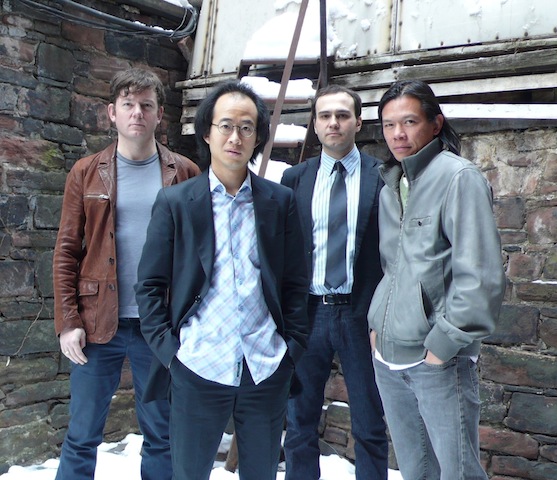Flux Quartet’s artistry makes Feldman’s six-hour opus an engrossing experience

The Flux Quartet performed Morton Feldman’s String Quartet No. 2 Saturday at the Park Avenue Armory.
Six hours of one uninterrupted piece of music might seem boring and physically exhausting. But perhaps the most remarkable thing about hearing Morton Feldman’s String Quartet No. 2 in concert is how intellectually invigorating and emotionally rewarding such a journey can be.
The work is a masterpiece of the quartet literature, a great composition that digests the sum of the repertoire that preceded it and creates a distillation of the genre.
As heard in the Flux Quartet’s brilliant performance in the Board of Officers room at the Park Avenue Armory—which began in the afternoon and extended past sunset—the music is full of life, variety, detail, and expressive eloquence.
String Quartet No. 2 has had limited exposure since its premiere in a shortened version by the Kronos Quartet in 1983. There are only two groups that play it regularly—Flux and the Pellegrini Quartet in Europe—and only one complete recording (Flux again, on Mode records).
Saturday’s audience, with latecomers, neared a sellout of the 140 seats, and about eighty stayed from beginning to end. Hearing the piece in its entirety is essential because every detail and moment matters.
This performance was the thirteenth the Flux Quartet has given since the 2002 release of their recording, and the third since last fall. Their pellucid playing was an expression of their understanding of and confidence in the music. Their sound throughout the concert was beautiful and revelatory with an acute sensation of substance and color. The exceptional acoustic makes it an ideal venue for Feldman’s quietly insistent and powerful sounds.
The work is massive in duration (5:45 in this performance) yet the actual music is quite lean. Feldman used a handful of musical ideas to create the piece, and he combines them with such intellectual mastery and notational craft that they create structures that just happen to take five to six hours to express their full means and intent. There are particular bits of music that appear and reappear in both exact and varied form, each time adding to the shape of the composition and altering the experience of everything that has come before.
There are stretches of slow, repeated chords that may strike the imagination as glacial, but they are merely contrasting sections in a work that is packed with constant activity: flurries of notes that have their rhythms stretched and compressed with each iteration; simple tonic-to-dominant chord changes; an important eight-note arch of a phrase that serves simultaneously as theme, interlude, fanfare and prelude. There is also a waltz, and two lively, almost jazzy, cello solos. Feldman’s scoring is an essential element, with ideas returning through different combinations of string tone, keeping the ear interested and refreshed.
Through-composed, the piece eschews time-filling tricks like drones or instructions for ad-libitum playing. The quartet is deeply embedded in the classical tradition: repetition establishes phrases as Haydn did, Feldman uses hocket, and there is a clear structure that unfolds across the duration, with contrasting sections—a sturm und drang final “movement” and a coda that neatly ties together all the material and the experience. The piece is the apotheosis of Debussy’s proportional forms.
The five to six hours of the experience matters, because what is most contemporary about the work is Feldman’s view of time. This music does not define the dimension as a linear path to a result. The Second String Quartet explores and expands on what can occur between the ticks of a clock. This is never boring, especially in this masterful concert.
Although it is impossible to keep close attention for the entire time, Feldman plants seeds of memory in the mind, and those are cultivated and grow each time a pattern or phrase returns. Across the expanse, slight variations have profound effect: the gradual expansions of a rhythms were powerfully engrossing; moments where violinist Tom Chiu and cellist Felix Fan added vibrato to a sustained or pizzicato note were astonishingly beautiful.
Entropy is not only unavoidable, but integral to a performance of String Quartet No. 2. The physical and mental demands on the musicians mean that a rhythm will occasionally falter, an attack will be slightly off, and each instrument will fall flat at a slightly different pace. Those moments—and there were only a handful—actually add warmth and humanity to the experience.
For an audience, listening to the whole thing is not overly daunting physically, somewhat akin to a trans-Atlantic flight. Instead of the constant, wearing noise of jet engines, there is the delicate but febrile loveliness of the chords, the clusters of harmonics that sound like a glass harmonica, the fascination in hearing the rhythms played with such clarity and precision.
Some audience members took occasional breaks, outhers lounged on couches in the antechamber; one gentleman pulled out a book. The rousing, passionate ovation at the end was a show of appreciation and solidarity for Morton Feldman, his music and and musicians, and a sign of how invigorating, even transformative, this concert was.



Posted Apr 28, 2014 at 2:22 pm by Bruce A. Russell
FLUX’s recording is not the only complete one. It was preceded by the premiere recording – the Ives Ensemble on Hat Hut Records, released 2001.
Posted Apr 30, 2014 at 11:20 am by Jane Troy
I was there, and this is a beautiful account of the experience. Thank you for it.